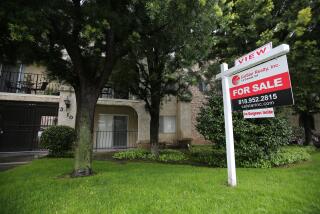More buyers of new homes back out
- Share via
WASHINGTON -- If you thought buying a new home was expensive, wait until you see how much it costs you to back out of the deal.
Some buyers have compelling reasons to want out of a home sale agreement. How can you buy if you no longer qualify for a mortgage, or if you haven’t been able to sell your old home?
Who wouldn’t walk away from a deal that’s worth $50,000 or $100,000 less than when the contract was signed?
If appraised values come in below the contract price, buyers may have to come up with more cash to follow through on such a deal. Sometimes walking away from a purchase is the least painful, most financially prudent option.
That’s why such cancellations have now reached one-third of sales. Nationwide builder Toll Brothers saw 28% of buyers cancel in the first quarter of this year, according to financial statements. Dallas-based Centex Homes’ cancellation rate was 33% in the third quarter of 2007, according to its most recent report to investors. NVR, which builds NV Homes and Ryan Homes, experienced a 37% cancellation rate in the fourth quarter.
These are just a few examples of a trend that is cutting across the industry.
So what happens to the tens of thousands of dollars those buyers paid as deposits? As you might imagine, builders don’t relinquish that money gladly.
Builders typically ask for 10% of the contract price as a deposit, said real estate lawyer Harvey Jacobs, who is the owner of Stress-Free Settlements, which operates in the Washington, D.C.-Maryland area.
“If you can get away with paying less, great,” he said.
Builders also typically ask for more cash to cover the price of options and upgrades.
In addition to the cash deposit, builders frequently ask buyers to sign a promissory note for an equal amount of money, Jacobs said. That note comes into play only at closing, when it becomes payable out of the buyer’s mortgage. It’s a liability that lies dormant but that serves to double the amount of cash the buyer has at stake if he or she pulls out of the deal.
Those promissory notes are builders’ attempts to stem that wave of cancellations. If buyers are willing to forfeit $50,000 to walk away from a $500,000 home sale, maybe being on the hook for $100,000 would keep them in the deal.
“I’m definitely seeing more letters saying, ‘We’re going to enforce your promissory note if you don’t close,’ ” Jacobs said.
What’s more worrisome, Jacobs said, is that many people don’t even realize they have signed such a note, just one page among the many included in a sales contract.
What do home builders have to say about promissory notes, or about deposits in general? Not much. CIA officers are more willing than home-building executives to talk with reporters. They really don’t see any benefit to demystifying their sales practices to would-be buyers.
The first opportunity you have to read a builder’s sales contract and the accompanying documents (which can be just as important -- and binding -- as the contract itself) could very well be when you are being asked to sign them.
Never sign a contract while you’re sitting in the sales office. When you’re writing a deposit check for tens of thousands of dollars, and signing a contract worth hundreds of thousands, you really deserve a few days to look at the specifics. Give yourself some time.
New-home sales contracts are drawn up by builders’ lawyers, and they favor the builders at every turn. But don’t believe the myth that their terms can’t be negotiated. In particular, negotiate to have your deposit money held in escrow by a title company or other third party.
With the staggering financial losses being reported by home-building companies lately, buyers need to ensure that cash is available if things don’t turn out the way they had planned.
More to Read
Inside the business of entertainment
The Wide Shot brings you news, analysis and insights on everything from streaming wars to production — and what it all means for the future.
You may occasionally receive promotional content from the Los Angeles Times.










